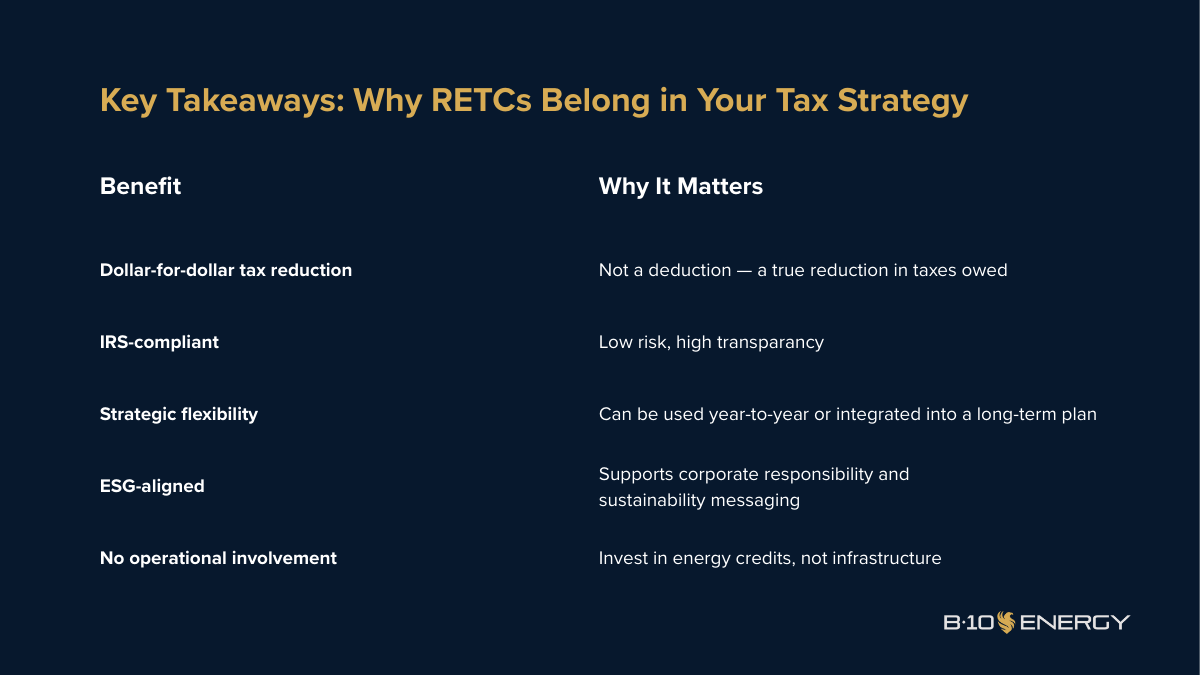
Strategic tax planning with energy credits allows C-corporations and high-net-worth individuals with passive income to reduce their federal tax liabilities while supporting verified clean energy projects. This blog explores how Renewable Energy Tax Credits (RETCs) can serve as a sophisticated, IRS-compliant tool for both financial optimization and corporate responsibility.
When it comes to smart tax planning, few strategies offer the dual advantage of financial benefit and public impact like Renewable Energy Tax Credits (RETCs). These credits are no longer just a niche interest for energy developers — they’ve entered the mainstream of high-level tax strategy, especially for C-corporations and individuals with significant passive income.
If you're looking for a way to reduce federal taxes while strengthening your ESG profile, this is a play worth understanding.
Energy credits, specifically RETCs, are federal tax incentives designed to promote investment in renewable energy projects like solar, wind, and geothermal systems. Through recent updates from the Inflation Reduction Act, these credits have become transferable, meaning they can be purchased by eligible entities rather than earned only by developers.
Unlike most deductions or deferrals, RETCs offer a dollar-for-dollar reduction of taxes owed — which is why they’ve become a core tactic in strategic tax planning for sophisticated earners.
RETCs allow buyers to reduce their federal income tax bill directly. For corporations, that means improved margins and shareholder value. For passive investors, it translates into more retained income and less tax drag.
You don’t need to build a wind farm to benefit. When you purchase credits from verified projects, you reap the tax rewards without any project development risk.
Unlike many “too good to be true” tax strategies, RETCs are IRS-sanctioned and fully traceable. When sourced from a verified provider like B10 Energy, each credit is tied to a real, compliant energy project.
Many of today’s top corporations have ESG goals—but not all know how to integrate them with financial strategy. RETCs solve that problem.
When you use energy credits as part of your tax planning, you're also:
This strategy isn’t just smart—it’s measurable. With verifiable project data, your ESG reporting gets a tangible boost.
Whether you’re exploring Renewable Energy Tax Credits (RETCs) for the first time or looking to expand an existing strategy, here’s how to integrate them effectively — and what it looks like when you work with B10 Energy:
First, confirm whether you qualify. RETCs can be used by:
Not sure? Our team can quickly help determine your eligibility.
With your CPA or tax advisor, identify how much federal tax liability you’re looking to offset. RETCs can be used to offset up to 75% of your federal income tax liability in a given year — making this a powerful tool for managing large obligations.
When you work with B10, we can coordinate directly with your CPA or tax team to streamline this step and ensure you’re maximizing the benefit within IRS guidelines.
This part matters. Not all energy credits are created equal — they must be verified, IRS-compliant, and backed by proper documentation. That’s where B10 Energy comes in.
Here’s what B10’s process looks like:
No guesswork. No unnecessary risk. Just clean, compliant execution.
Strategic tax planning isn’t just about lowering your tax bill — it’s about telling a story of smart, forward-thinking leadership. RETCs can support:
At B10 Energy, we help you position RETCs as a meaningful part of your brand narrative, not just a behind-the-scenes financial move.

RETCs are no longer just for renewable energy insiders. With new transferability rules in place, they are a legitimate, efficient, and impactful tool for strategic tax planning. If you’re a C-corporation or high-income individual with passive income, you may be missing out on one of the most overlooked tax strategies available today.
Contact B10 Energy to explore how Renewable Energy Tax Credits can reduce your tax burden while supporting verified clean energy projects.
Insights into sophisticated tax benefits designed for high-net-worth individuals and businesses.